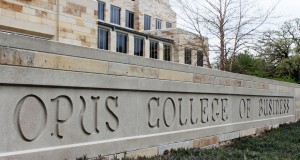Juniors and seniors who will register for fall 2012 classes now will have an option to choose a new section of family business management.
Previously, students enrolled in the family business management course had to have a family member participate in the class with them, now the family member does not. The course, ENTR 349, will now be offered in two sections and is geared toward students who are planning to work in, advise or start a family business.

Rich Sorenson, family business center academic director, said the course is focused primarily on the governance of successful family businesses, and though it has been offered at St. Thomas for many years, it’s different this year.
“In the past we’ve only admitted students who have a family member come with them to the class,” Sorenson said. “We’re offering a section that’s open to anyone who has an interest.”
Sorenson said the new section is being offered because some students’ parents are not able to attend required class sessions.
“About 30 to 40 percent of students come from a family-owned business, and some aren’t ready to decide to go back and work in their family’s business,” Sorenson said. “They may want to know, ‘Well if I were to go back, how could it be managed so that it will be a good situation for me and my family?’”
Senior Melody Byanyima, a human resources and entrepreneurship major, said she thinks the new course section will be helpful.
“It’s important for them to know the fundamental principles of a family business,” Byanyima said. “A family business is not just like any other business, it’s different because family members are interacting on a daily basis.”
Byanyima took the traditional section of family business management by skyping with her family in Africa, and said the different time zones made it necessary for her to wake up at 3 a.m. to do the course work with her parents.
“I had to keep on like waking up when it was morning their time so that I could communicate to them when they were fresh and ready to start their day,” she said.
Sorenson said that Byanyima was not the only student who faced timing and logistical challenges, and the traditional section of the course was slightly redesigned for the fall.
“We’ve changed the dates that it’s offered to make it easier for families who live outside of town to come and participate,” Sorenson said. “We’ll meet on a Thursday night and a Friday, and that way we can get through a lot of material in four weekends that will help the family.”
Sorenson said that even though family businesses employ 80 percent of the U.S. workforce, St. Thomas is just one of few business schools that offer courses and a concentration in family business.
“I think that family businesses are really the heart and soul of communities and that by strengthening them, we are strengthening communities,” Sorenson said.
Byanyima, who plans to return to Kampala, Uganda, to work in her family’s transportation business, said that the course was very helpful and practical.
“This class was the best thing that happened to my family business,” she said.
Heidi Enninga can be reached at enni5264@stthomas.edu.



